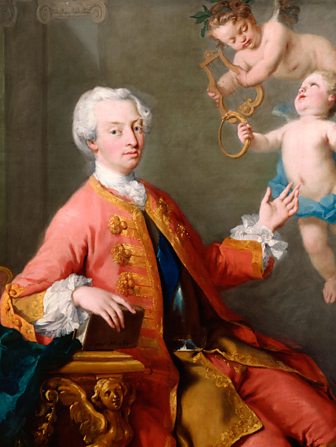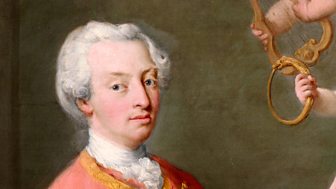Frederick Prince of Wales
Poor ‘Fred’, as he’s often called. Frederick Prince of Wales (1707-1751), who died before his father, and therefore never became king.
Frederick is best-known today for the epic rows he had with his dad, . Each Georgian king - Georges I, II, and III - suffered an appalling relationship with his eldest son. In Fred’s case, he probably felt abandoned by his parents when he was left behind in Hanover, aged seven, after they went off to London to take up their new role as Britain’s Royal Family.
Fred was a kindly soul, who loved music and the arts.Lucy Worsley
Known as ‘Fretz’ by his German-speaking family, Fred was slight and feminine in appearance. His hair was ‘yellowish’, his face ‘not handsome; his eyes grey like a cat and very dull’. His legs were spindly because he’d suffered from rickets. But he made up for his lack of looks with charm, having ‘something so very engaging and easy in his behaviour’ and he was very amusing: ‘the Lord knows what a mimic!’
In Hanover, the young Fred was taught English and sent packets of Parliamentary papers and models of British warships in preparation for his future role as king of Britain.
But in 1728, when the grown-up Fred arrived in London to live with his parents once more, the fireworks began. His father thought Fred too impatient to sit on the throne, and all the politicians who had not been able to get posts at court turned instead to this Prince of Wales and formed a kind of opposition party against the king.
The most spectacular example of Fred’s determination to spite his father came when his teenage wife, Princess Augusta, went into labour. Fred decided that the King, George II, should not have his traditional right of being present at the birth of his grandchild. So when Augusta’s pains began, Fred forced her into a carriage and drove her away from the royal palace by night. He had to hold her writhing body down with such force that he later complained he’d put his back out.
Despite his immature behaviour towards his parents and wife, Fred was a kindly soul, who loved music and the arts. Many were disappointed that he never got the chance to be king. In 1751, he caught a cold, which went to his chest, and finally a pulmonary embolism – a clot of blood in the lungs – finished him off. Sadly, it’s less exciting than the common (but incorrect) story that he was killed by being hit on the head with a cricket ball.





